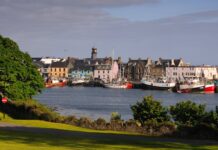
A South Korean female free diver jumps into the sea from a boat off the coast of Jeju Island on Jan. 15, 2022. New research has found that these women, known as Haenyeo, have specific genetic adaptations connected to cold tolerance and blood pressure. SeongJoon Cho/Bloomberg via Getty Images hide caption
toggle caption
SeongJoon Cho/Bloomberg via Getty Images
A couple of years ago, Melissa Ilardo found herself aboard a motorboat traversing the ocean around Jeju Island, which sits some 50 or 60 miles off the coast of South Korea. Before the vessel had even come to a stop, an older woman in a wetsuit, fins and a mask stepped into the water. Two others followed her.
These women, whose plunge Ilardo captured on video, belong to a long line of female free divers on Jeju Island called the Haenyeo.
They swam off, each with a net bag in tow, to collect seafood to eat and sell. “Things like abalone, sea urchins … seaweeds sometimes,” says Ilardo, an evolutionary geneticist at the University of Utah. The Haenyeo routinely dive in waters that she says are 50 degrees Fahrenheit at the surface, at best.
“One of the first times I was there,” Ilardo recalls, “it was snowing. They said as long as there’s not a risk that they’re going to be blown away to sea, then they still go out in the water, no matter how cold it is.”

Goats and Soda
Black Death survivors gave their descendants a genetic advantage — but with a cost
The women start diving as girls and continue well into old age, across all of life’s milestones. “They dive throughout their whole pregnancy,” says Diana Aguilar-Gómez, a population geneticist at UCLA. “They say they just dive until basically before they give birth” and are back in the water a few days later.
Ilardo wanted to know how the Haenyeo are capable of enduring such an extreme lifestyle, she says: “How evolution might have shaped the Haenyeo to be better divers, to dive more safely, to dive for longer.”
In a study published in Cell Reports, Ilardo, Aguilar-Gómez and their colleagues reveal the adaptations that make the Haenyeo’s superpower possible. It’s a mix of physiological and genetic changes, some of which appear to have had an impact on the entire population of Jeju Island.

The Salt
The Secret To The Inuit High-Fat Diet May Be Good Genes
A “silly” experiment with clear results
Ilardo decided to compare the Haenyeo to other elderly women on Jeju Island who aren’t divers but have a similar genetic background, and to still others off-island who aren’t related. There were about 30 in each group.

A Haenyeo diver swims to catch turban shells and abalones on Nov. 6, 2015. Chung Sung-Jun/Getty Images hide caption
toggle caption
Chung Sung-Jun/Getty Images
There was one problem: “You can’t take 70-year-old women who have never been diving and throw them in the open ocean,” says Ilardo.
Fortunately, there’s a workaround. It’s called a simulated dive. “You hold your breath and put your face in a bowl full of cold water,” says Ilardo, “and your body responds as if you’re diving. Your heart rate will drop measurably.”

Goats and Soda
The Science Behind The Super Abilities Of Sherpas
The Haenyeo found the experiment a little silly. “They said getting in the ocean, being underwater, that’s diving. Whatever this is, this isn’t diving,” recalls Ilardo. “But they still held their breath long enough that we were able to elicit a response.”
That response was significant: The Haenyeo heart rate fell by about 50% more than their non-diving peers. “We had one diver whose heart rate dropped over 40 beats per minute in 15 seconds,” says Ilardo.
She concludes that this is classic physiological adaptation. That’s because the cohort of other women from Jeju — the non-divers with similar genetic makeup — didn’t experience the same drop in heart rate. The difference between the two groups is due to a lifetime of diving experience.

Shots – Health News
Why Sweat Is A Human Superpower
Pushing the body to its limits
Next, the researchers took saliva samples to look for genetic differences between the different groups. Everyone from Jeju — both the Haenyeo and the non-divers — had basically the same genes, meaning that the people of this island appear to have been genetically sculpted by generations of divers.
“What this suggests is that everybody in Jeju has an equally likely chance of being a descendant of a diver,” says Ilardo.
Two genes stood out in the analysis. The first one seems to be related to cold tolerance. “Maybe that protects them from hypothermia in ways that we don’t fully understand yet,” she suggests.
The second gene was associated with blood pressure, likely connected to blood vessel structure and function.
“Diving increases your blood pressure,” says Aguilar-Gómez, who did this work as a Ph.D. student at UC Berkeley, “and particularly through pregnancy that can be very dangerous. It can increase your risk for preeclampsia” and other potentially life-threatening complications.
“Even if you didn’t die, probably women that were protected against this would be more likely to have more children,” she says, and more likely to pass their protective genes along.
In addition, Jeju Island has one of the lowest rates of stroke mortality in all of South Korea. And since stroke can result from high blood pressure, Ilardo thinks the low mortality could be related to this second protective gene.
“Wouldn’t it be amazing if by studying divers in Korea, we can translate these findings to develop a therapeutic that protects people from stroke around the world?” says Ilardo. “By studying these populations, it can lead to discoveries that could have really important implications for people everywhere.”
Stephen Cheung studies extreme physiology at Brock University in Canada and wasn’t involved in the research. He says he finds the work fascinating. “By pushing the body to its limits,” he says, “we get a better sense of where those limits are, but also just what the human body is capable of.”
It’s a conclusion that Aguilar-Gómez agrees with. “I’m not even near the age of these women and I don’t think I can go and dive all day,” she says. “I feel like that’s a superpower.”
Ilardo says she and her team returned to Jeju to share the results with the Haenyeo — whose way of life is dwindling — and make sure they knew the top-line conclusion.
“These women are extraordinary,” she says. “Their biology is amazing and what they do is amazing. And so I think it’s really important to celebrate just how unique and special these women are — and how it’s changed their bodies and the bodies of other people on this island.”












